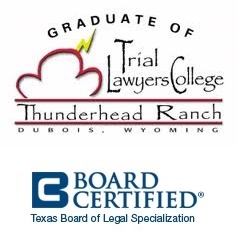Child Abuse
Parents, family members, guardians or caretakers of children are often alarmed or stunned that they are accused of child abuse or neglect in the Greater Houston area. Because of reporting requirements in Texas, law enforcement officers usually will investigate almost all reports of discipline or physical abuse, including slapping, hitting, spanking, kicking, beating, broken bones or any welts, bruises or marks on the child.
Although bruises and marks alone are insufficient evidence for a child abuse conviction, allegations of child neglect or abuse can result in serious consequences if the alleged abuser is convicted or placed on probation, including jail time, fines, irreparable harm to reputation, humiliation, loss of parental rights and/or a permanent criminal record.
Charges or accusations of child neglect or abuse do not have to result in a criminal conviction. To do so, each and every element of the offense has to be proved beyond a reasonable doubt by the state prosecutor. This burden of proof is very high and the State often has difficult in meeting it. If the jury has a reasonable doubt you committed every element of the offense, you will be found not guilty. If the State does not believe they can prove their case at trial, the State may offer to reduce the charges to a misdemeanor or even dismiss the charges outright. Therefore, it is extremely important that you contact an experienced criminal trial law==yer in the Greater Houston area who will investigate your case and suggest the best legal strategy to defend you.
Houston Child Abuse Lawyer
Contact James Sullivan & Associates for a consultation at (281) 546-6428 about your allegations of child abuse or child neglect.
What is Child Abuse in Houston?
Texas law defines abuse under Texas Family Code §261.001(1) as any of the following acts or omissions:
- Mental or emotional injury to a child that results in an observable and material impairment in the child’s growth, development, or psychological functioning;
- Allowing a child to be in a situation where the child receives mental or emotional injury;
- Physical injury or threat of substantial harm to the child;
- Failure to make a reasonable effort to prevent the acts of another person that results in physical injury that results in substantial harm to the child;
- Sexual conduct harmful to a child’s emotional, mental or physical welfare including conduct that constitutes the offense of continuous sexual abuse of young child or children (Texas Penal Code §21.02), indecency with a child (TPC § 21.11) sexual assault (TPC §22.011) or aggravated sexual assault (TPC § 22.021);
- Failure to make a reasonable effort to prevent sexual conduct harmful to a child;
- Compelling or encouraging a child to engage in sexual conduct such as prostitution or pornography;
- Using a controlled substance by a person in a way that the use results in mental, emotional or physical injury to a child;
- Causing, allowing or encouraging a child to use a controlled substance; and/or
- Causing, allowing, encouraging, or engaging in a sexual performance by a child (TPC § 43.25).
- Leaving a child in a situation where the child would be exposed to a substantial risk of physical or mental harm, without arranging for necessary care for the child, and the demonstration of an intent not to return by a parent, guardian, or managing or possessory conservator of the child;
- Placing a child in or failing to remove a child from a situation that a reasonable person would realize requires judgment or actions beyond the child’s level of maturity, physical condition, or mental abilities and that results in bodily injury or a substantial risk of immediate harm or harmful sexual conduct;
- The failure to seek medical care for a child that results in a substantial risk of death, disfigurement or bodily injury or with the failure resulting in an observable and material impairment to the growth, development, or functioning of the child; and/or
- The failure to provide a child with food, clothing or shelter necessary to sustain the life or health of the child, excluding failure caused primarily by financial inability unless relief services had been offered and refused.
- Serious bodily injury,
- Serious mental deficiency, impairment or injury, or
- Bodily injury.
- An individual charged with a child abuse offense involving criminal negligence by the alleged offender can be convicted of a state jail felony. A state jail felony is punishable by 180 days to two years in jail and/or a fine up to $10,000.
- An individual charged with a child abuse offense involving reckless actions by the alleged offender that resulted in bodily injury can be convicted of state jail felony. A state jail felony is punishable by a fine up to $10,000 and/or a jail sentence ranging from 180 days to two years.
- An individual charged with a child abuse offense involving intentional or knowing actions by the alleged offender that resulted in bodily injury can be convicted of a felony of the third degree. A felony of the third degree is punishable by two to ten years in prison and/or a fine up to $10,000.
- An individual charged with a child abuse offense involving reckless actions by the alleged offender that resulted in serious bodily injury or serious mental injury can be convicted of a felony of the second degree. A felony of the second degree is punishable by two to 20 years in prison and/or a fine up to $10,000.
- An individual charged with a child abuse offense involving intentional or knowing actions by the alleged offender that resulted in serious mental injury or serious bodily injury can be convicted of a felony of the first degree. A felony of the first degree is punishable by a prison sentence ranging from five to 99 years and/or a fine not more than $10,000.
- nurses,
- doctors,
- mental health practitioners,
- attorneys,
- members of the clergy,
- teachers,
- reproductive service clinic or facility employees,
- juvenile probation officers,
- juvenile detention or correctional officers, and/or
- day-care employees.


